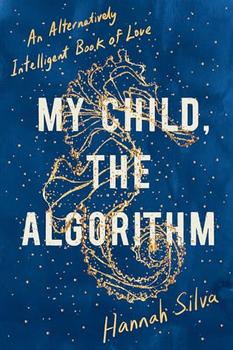
An Alternatively Intelligent Book of Love
by Hannah Silva
A playful and provocative exploration of queer single parenting and love, in conversation with an AI algorithm and a toddler.
My Child, the Algorithm describes encounters between a single parent, a curious, verbal toddler, and a language-producing algorithm. Like a male seahorse, Hannah Silva carried a baby made from her partner's egg. But when she gave birth, her partner left, and Hannah found herself navigating life alone with her child, surviving on United Kingdom universal credit, humor, and buckets of imagination.
As she navigates friendship, dating, and life as a queer parent in London, Hannah begins cowriting with an open-source language model, a precursor to ChatGPT, feeding the algorithm language and receiving language in return. Through her interactions with her toddler and the algorithm, expressions of humor, play, and insight begin to emerge. With the help and disruption of these unreliable narrators, Hannah deconstructs her story and constructs a new one, unraveling what she has been taught to want, finding alternative ways of thinking, loving, and parenting today.
"A striking reflection on the intersection of queer single parenthood and AI ... [T]he book is consistently surprising and far ranging in scope ... [T]he writing is curious, intelligent, propulsive, and memorable. Silva's text manages to be both immensely readable at first glance and rewarding to those who choose to read slowly, savoring and annotating ... [T]he author's inventiveness and emotional urgency make this book an intriguing reading experience. Silva is a playful theorist with an elastic intellect." —Kirkus Reviews
"This is the perfect read for non-fiction readers who love to be challenged and inspired." —Ameema Saeed, SheDoesTheCity
"Hannah Silva's My Child, the Algorithm, is one of the best books I read this year. Merging the cozy familiarity of child-rearing with the mysterious tension of AI (or is it the mysterious tension of child-rearing with the cozy familiarity of AI?), she has created a new genre of personal narrative, and a story whose grief, hope and curiosity takes on poetic, spiritual dimensions, even when exploring the most common chambers of the human heart." —Michelle Tea, author, Knocking Myself Up
This information about My Child, the Algorithm was first featured
in "The BookBrowse Review" - BookBrowse's membership magazine, and in our weekly "Publishing This Week" newsletter. Publication information is for the USA, and (unless stated otherwise) represents the first print edition. The reviews are necessarily limited to those that were available to us ahead of publication. If you are the publisher or author and feel that they do not properly reflect the range of media opinion now available, send us a message with the mainstream reviews that you would like to see added.
Any "Author Information" displayed below reflects the author's biography at the time this particular book was published.
Hannah Silva is a writer and performer working in sound poetry, radio, and experimental non-fiction. Her record 'Talk in a bit' was included in the Wire's Top 25 Albums of 2018. She has written eight plays for BBC Radio 3 and 4, and won the Tinniswood Award for best script and numerous placements in the BBC Audio Drama Awards. Her debut poetry collection Forms of Protest was Highly Commended in the Forward Prizes. She has an MFA in Theatre Practice and a PhD on poetry in performance from Stirling University. She is currently a Leverhulme Early Career fellow at Queen Mary University, London. Her play for BBC Radio 4 'An Artificially Intelligent Guide to Love' starred Fiona Shaw and was the starting point for My Child, the Algorithm. She lives in London with her child.




When men are not regretting that life is so short, they are doing something to kill time.
Click Here to find out who said this, as well as discovering other famous literary quotes!
Your guide toexceptional books
BookBrowse seeks out and recommends the best in contemporary fiction and nonfiction—books that not only engage and entertain but also deepen our understanding of ourselves and the world around us.